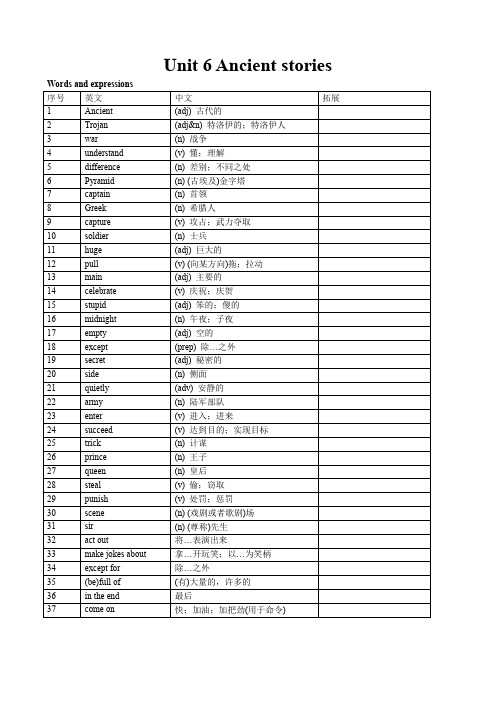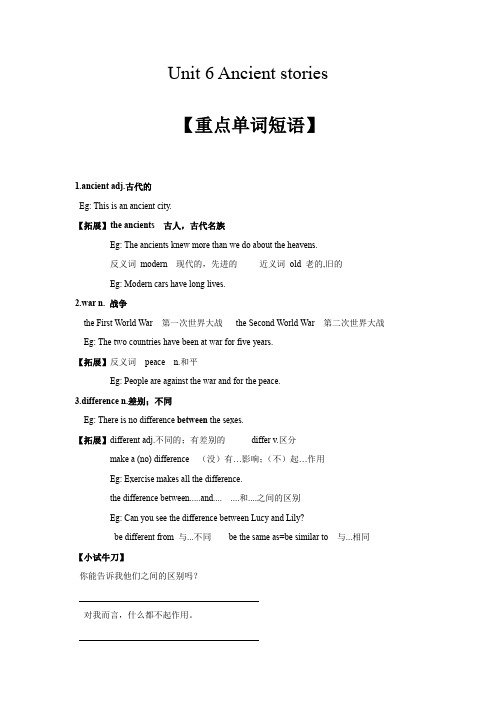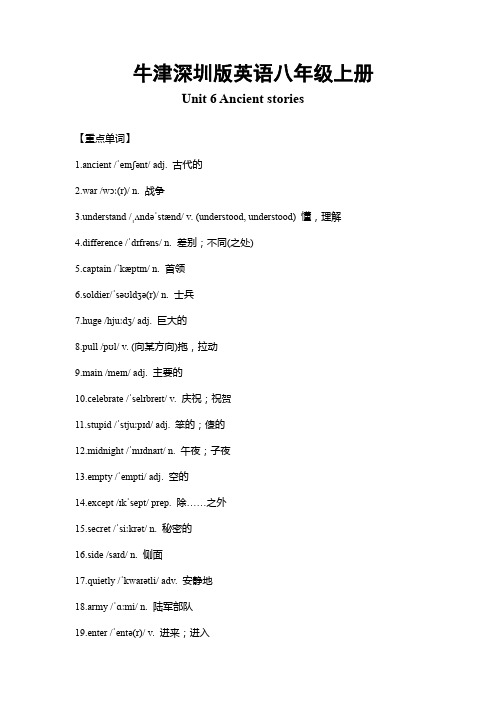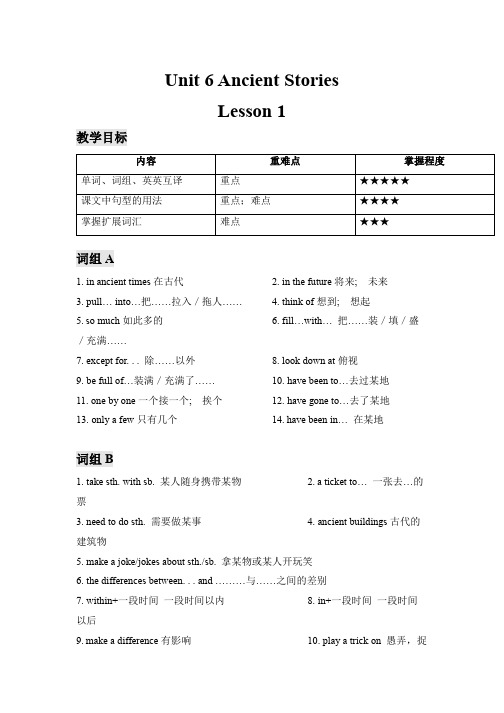牛津深圳版 八年级英语初二上册 Unit 6 Ancient stories单元课件
牛津深圳版八年级上册 Unit 6 Ancient stories词汇及基础知识过关

Unit 6 Ancient stories【课堂练习】一.英汉互译。
A.Words:1.古代的__________________2.特洛伊人__________________3.战争__________________4.懂;理解__________________5.差别;不同(之处)__________________6.(古埃及的)金字塔__________________7.首领__________________ 8.希腊人__________________9.用武力夺取;攻占__________________ 10.士兵__________________11.巨大的__________________ 12.(向某方向)拖;拉动__________________13.主要的__________________ 14.庆祝;庆贺__________________15.笨的;傻的__________________ 16.午夜:子夜__________________17.空的__________________ 18.除…之外___________________19 secret__________________ 20 side__________________21 quietly__________________ 22 army__________________23 enter__________________ 24 succeed__________________27 trick__________________ 28 prince__________________29. queen__________________ 30 steal__________________31 punish__________________ 32 scene__________________B.Phrases:1.将…表演出来__________________2.拿…开玩笑__________________3.除…之外__________________4.(有)大量的;(有)许多的__________________5.最后__________________6.(用于命令)快;加油;加把劲__________________7.攻占我们的城市__________________8.把…放入__________________9.入睡__________________ 10.从我的童年起__________________11 by midnight__________________ 12 climb out of…__________________13 one by one__________________ 14 by fighting__________________15 in one night__________________ 16 succeed in doing…__________________二.根据要求写出相应的单词。
牛津深圳版英语八年级上册Unit 6 Ancient stories Grammar教案

教案5课题课型备课时间1period教材分析教学目标1. Students can master the present perfect tense.2. Learn the usage 、structures 、adverbial time of theP.P and the forms of the verbs.教学重点the usage 、structure s 、adverbial time of the P.P andthe forms of the verbs.教学难点延续性动词与瞬间性动词的理解教学关键运用自我归纳的方式使学生掌握时态教法与学法指导任务教学法,直观教学,小组合作教学环节主要教学步骤或内容学生主体活动教师活动设计意图时间分配第一环节复习回忆平移的根本性质,引入课题StepⅠ:Warming up 1.Work t ogetherwith the teacherto review theusage of thestruc ture 、theadverbial timeand so on of thesimple pasttense..2.Stuents answersome questions1.Review thesimple pasttense withthestudents.2.Ask themsomequestio nsusing P.P.通过对一般过去时的学习,告知学生学习完成时与一般过去时的方法一样,通过带有现在完成时的问题让学生进入现在完成时。
5第二环节观察操作、探索归纳平移的作StepⅡ:L. 1.Students workin group to writedown the past andpartic iples ofsome words.1.PPT 上展示一些动词,要求同学们讨论过去式与分词。
小组合作文成过去式与过去分词书写,有助于学生提高积极性,参与课堂,为后面教学作铺垫10法第三环节课堂练习StepⅢ: While task. 1. Students writedo wn the negativesentence andother forms of thepresent perfecttense.2.Practicewriting moresentence.3.Summarize thestructure ofpresent perfecttense.1.Write downa positivesentencesthen askstudents tochange itintonegative andquestionone.2.Ask them tochange more.3. Help themto summarizethestructure ofthe P.P.通过教师所给的句子,学生写出否认句,一般疑问句,特殊句句型,有助于学生笔头锻炼,更重要的是更直观的了解完成时时态,通过自我归纳知识掌握更深刻5第四环节课时小结StepⅣ:for /since 1.Learn somesentences withfor and since.2.Find out for andsince followedwith a presentperfectsentences.3.Studentsummarize theadverbial time ofthe presentperfect tense.1. Showstudentswith for andsentence.2.ask them toexamine thekinds ofverbs.3.Ask them tosummarizetheadverbialtime of thepresentperfecttense.学生使用for与since 时间状语引导的现在完成时。
牛津深圳版英语八年级上Unit6 Ancient stories 单词+语法(现在完成时+since,for+时态区别)(无答案)

Unit 6 Ancient stories【重点单词短语】1.ancient adj.古代的Eg: This is an ancient city.【拓展】the ancients 古人,古代名族Eg: The ancients knew more than we do about the heavens.反义词modern 现代的,先进的近义词old 老的,旧的Eg: Modern cars have long lives.2.war n. 战争the First World War 第一次世界大战the Second World War 第二次世界大战Eg: The two countries have been at war for five years.【拓展】反义词peace n.和平Eg: People are against the war and for the peace.3.difference n.差别;不同Eg: There is no difference between the sexes.【拓展】different adj.不同的;有差别的differ v.区分make a (no) difference (没)有…影响;(不)起…作用Eg: Exercise makes all the difference.the difference between.....and.... ....和....之间的区别Eg: Can you see the difference between Lucy and Lily?be different from 与...不同be the same as=be similar to 与...相同【小试牛刀】你能告诉我他们之间的区别吗?对我而言,什么都不起作用。
4.huge adj. 巨大的,只能指体积的巨大或超过标准的巨大,相当于very large Eg: They live in a huge house.5.pull v.(向某方向)拖,拉动Eg: She pulled the drawer open.【拓展】pull down 把某物拉下,拆毁;pull out 拉出,拔出反义词push vt. 推6.main adj. 主要的mainly adv. 大部分地,大体上,主要地Eg: My main reason for learning English is to get a better job.7.celebrate v. 庆祝;庆贺celebration n. 庆祝;庆祝会(仪式)Eg: Tom celebrated his 24th birthday with his friends two days ago.The company will celebrate its tenth anniversary this year.8.stupid adj. 笨的,傻的foolish adj. 傻的silly adj. 愚蠢的Eg: Don’t be so stupid!9.midnight n. 午夜;子夜at midnight 在午夜;在半夜by midnight 在午夜前Eg: They had to leave at midnight.10.empty adj. 空的反义词:full adj. 满的Eg: My glass is empty.11.except prep.除…之外Eg: The museum is open every day except MondayI like everything except math.【辨析】except ,besides, except for, but(1)except介词“除......之外”,表示将一个或几个人或物从同一类人或物中排除。
牛津深圳初中英语八年级上册《Unit 6 Ancient stories Grammar教案

Unit 6 GrammarContents Unit6 –Grammar &More PracticeAims Knowledge1) To help the Ss conclude the usage of the presentperfect tense2) To enable the Ss to master the usage of thepresent perfect tense by doing exercises3) To teach Ss some language pointsSkills To train Ss’ reading skil l---read more practice by using skimming and scanning skillEmotion To broaden Ss’eye sight of learning about educational exchangeLanguage Focus 1)Learn s ome language poi nts in More Practice2)Teach Ss the grammar of the present perfect tenseTeaching Aids PPT, BlackboardProceduresStep Tea ching’sactivityStudents’ activity PurposesI. Grammar 1 Greetings2 Leading inShow some sentencesand let the studentsdiscuss a nd work outthe rules of thepresent perfecttense3 Exercises4 practiceShow some sentencesand let the studentsdiscuss and work outthe rules of thepresent perfecttense with for/since5 work out thedifference betweenthe simple past tenseand the presentperfect sentenc e.Summary what wereview this lesson.Try to find out therule by themselves byreading the examplesFinish the exercisesTry to find out therule by themselves byreading the examplesFinish the exercisesTalk with partnersBe familiar with thetopicTo teach Ss the ruleof grammar and letSs learn and findout the ruletogetherTo let Ss practisetheir oral Englishby using the grammarII. More practice 1. show some newwords about the storyRead the story andanswer the questionsbelow2. Ask students tocomplete the story ifyou are one of c a ocaos soldiers.3.Exerc ises doingRead the articles withQsTake notesTalk with yourpartners and answerthe QsTo be familiar withthe topicLearn more languagepoints of morepractice and learnthe usage of themThink more about thetopic and speakingtrainingIV. Homework 1) Recite the whole article2) 英语周报一张Reflection。
牛津深圳版英语八上《Unit6 Ancient stories_Grammar》(共38张PPT)

4.I had a big meal last night.
I have not had breakfast yet.
Structure 结构
Usage 用法
Marker 标志词
ቤተ መጻሕፍቲ ባይዱ
The simple past tense 一般过去时
However, the Red Queen __tr_i_ed__(try)
to use the time machine to control the Wonderland. So I __s_to_l_e_(steal) the
time machine and travelled to the past. I _f_o_ug_h_t_(fight) against the Red Queen and her army. Luckily, I __w_o_n__(win) at
3) TThoepyTouinpg: mCairnclaelretahdeykweryotweotrhdrse.e
books. ___________________ 4) He has written his first book in 2001. __________________________ 5) I went to Shanghai twice. __________________________ 6) What have you done yesterday? __________________________
I __ha_v_e__ already ___b_e_en_(be)
to Shanghai Disneyland.
牛津深圳版英语八年级上册Unit 6 Ancient stories 重难点知识归纳总结

牛津深圳版英语八年级上册Unit 6 Ancient stories【重点单词】1.ancient /ˈeɪnʃənt/ adj. 古代的2.war /wɔː(r)/ n. 战争3.understand /ˌʌndəˈstænd/ v. (understood, understood) 懂,理解4.difference /ˈdɪfrəns/ n. 差别;不同(之处)5.captain /ˈkæptɪn/ n. 首领6.soldier/ˈsəʊldʒə(r)/ n. 士兵7.huge /hjuːdʒ/ adj. 巨大的8.pull /pʊl/ v. (向某方向)拖,拉动9.main /meɪn/ adj. 主要的10.celebrate /ˈselɪbreɪt/ v. 庆祝;祝贺11.stupid /ˈstjuːpɪd/ adj. 笨的;傻的12.midnight /ˈmɪdnaɪt/ n. 午夜;子夜13.empty /ˈempti/ adj. 空的14.except /ɪkˈsept/ prep. 除……之外15.secret /ˈsiːkrət/ n. 秘密的16.side /saɪd/ n. 侧面17.quietly /ˈkwaɪətli/ adv. 安静地18.army /ˈɑːmi/ n. 陆军部队19.enter /ˈentə(r)/ v. 进来;进入20.succeed /səkˈsiːd/ v. 达到目的;实现目标21.trick /trɪk/ n. 计谋22.prince /prɪns/ n. 王子23.queen /kwiːn/ n. 王后24.steal /stiːl/ v. (stole, stolen)偷;窃取25.punish /ˈpʌnɪʃ/ v. 处罚;惩罚26.scene /siːn/ n. (戏剧或歌剧的)场27.sir /sɜː(r)/ n. 先生【重点短语】1.act out 将……表演出来2.make jokes about 拿……开玩笑;以……为笑柄3.except for 除……之外4.(be) full of (有)大量的;(有)许多的5.in the end 最后e on (用于命令)快;加油;加把劲7.one by one 一个接一个8.in ancient times 在古代9.climb out of 从……爬出来10.succeed in doing. sth 成功地做成某事11.play a trick 恶作剧;捉弄12.fall asleep 入睡;睡着13.under attack 受到攻击14.at the beginning 从一开始15.in the middle 在中间16.at the end of 在……结束时【重点句型】1.They’ve tried to capture our city for ten years.他们十年来一直试图占领我们的城市。
深圳牛津英语八上Unit 6 Ancient Stories

Unit 6 Ancient StoriesLesson 1教学目标词组A1. in ancient times在古代2. in the future将来; 未来3. pull… into…把……拉入/拖人……4. think of想到; 想起5.so much如此多的6. fill…with… 把……装/填/盛/充满……7. except for. . . 除……以外8. look down at俯视9. be full of…装满/充满了…… 10. have been to…去过某地11. one by one一个接一个; 挨个12. have gone to…去了某地13. only a few只有几个14.have been in… 在某地词组B1. take sth. with sb. 某人随身携带某物2.a ticket to… 一张去…的票3. need to do sth. 需要做某事4. ancient buildings古代的建筑物5. make a joke/jokes about sth./sb. 拿某物或某人开玩笑6. the differences between. . . and ………与……之间的差别7. within+一段时间一段时间以内8. in+一段时间一段时间以后9.make a difference有影响10. play a trick on 愚弄,捉弄11. pull down把某物拉下,拆毁12. pull out拉出,拔出13. join the army参军14.enter for报名参加15.succeed in doing sth成功地做某事16. climb out of 从……里爬出来英英释义1. be full of = be filled with 充满….2. try to do sth. = attempt to do sth. 努力做某事3. huge = extremely large巨大的4. give up = stop doing sth. 放弃做某事5. succeed in doing sth. (美式英语) = manage to do sth.(英式英语) 成功做了某事6. go to sleep = start sleeping 去睡觉7. leave = go away from a place or a person 离开8. except = but not 除……之外,表示所说的不包括在内9. main = most important 主要的10. enter = go into / come into 进入课文The Trojan horseThe captain stood on the high wall of the city of Troy. “The Greeks have gone and we’ve won,” he said. “They’ve tried to capture our city for ten years. Now they’ve given up and sailed away!”“But look over there,” a soldier said. “They’ve left a huge wooden horse.”“Ah, yes,” the captain said, “it’s too big. The Greeks didn’t want to take it with them. Get some help and pull it into the city.”That night, in the main square of the city, all the Trojans celebrated. They sang and danced around the horse, and made jokes about the stupid Greeks. “I haven’t laughed like this since my childhood,” the captain said. After the party, they locked all the gates of the city and then all went to sleep.By midnight, the main square was empty, except for the huge horse. Suddenly a secret door opened on the side of the wooden horse. The horse was full of Greek soldiers! They quietly climbed out of the horse one by one. The soldiers opened the main gates. The Greek army entered the city. For ten years, the Greeks could not capture the city by fighting. In one night, however, they succeeded in capturing it through a clever trick.重点句型解析A1. The captain stood on the high wall of the city of Troy. 首领站在特洛伊城的高墙上。
牛津深圳版英语八年级上册unit6-ancient-stories完整版

Unit 6 Ancient stories1. understand 【v.】懂,理解 (understand - understood - understood)▲make oneself understood 表达自己的意思,让旁人理解自己的意思【例】Can you make yourself understood in English? 你能用英语表达自己的意思吗?2.difference 【n.】区别,不同之处▲常用结构:the difference(s) between... and... 。
与。
之间的差别different 【adj.】不同的,差别的常用结构:be different from 与......不一样反义词:be the same as 与......相同differently 【adv.】不同地,差别地【例】Can you find the differences between the two?The chairs in your house are different from ours?3. captain 【C.】队长,首领,船长【例】His father is a captain.4. huge 【adj.】庞大的,巨大的 =very big▲【例】The party was a huge success. 聚会非常成功。
5. main adj. 主要的 =very important【例】the main gate, the main street.6. celebrate 【v.】庆祝,庆贺 celebration【n.】祝贺Eg: All the Chinese people are celebrating the Spring Festival.7. except & except for & besides▲★请先观察下面例句中 except和 except for 的用法,然后补全结论部分所缺内容。
- 1、下载文档前请自行甄别文档内容的完整性,平台不提供额外的编辑、内容补充、找答案等附加服务。
- 2、"仅部分预览"的文档,不可在线预览部分如存在完整性等问题,可反馈申请退款(可完整预览的文档不适用该条件!)。
- 3、如文档侵犯您的权益,请联系客服反馈,我们会尽快为您处理(人工客服工作时间:9:00-18:30)。
【2】difference n. way in which two people or things are not the same 差别;不同(之处) What’s the differences between the two cars?这两部 车有什么不同? 【同根词】 (1) different adj. 不同的 This bike is different from that one. 这辆自行车和那辆不 一样。 (2) differently adv. 不同地 How could you have handled it differently? 你能以不同 的方式完成它吗? 【应用】 They are twins, but they look __________ different (difference).
二、根据汉语写出下列词组 1. 将……表演出来 act ____________________ out make jokes about 2. 拿……开玩笑;以……为笑柄 __________________ 3. 最后 ____________________ in the end 4. (用于命令)快;加油;加把劲 come ________________ on (be) full of 5. (有)大量的;(有)许多的 ____________________ succeed in doing 6. 成功做…… ____________________ 7. 除……之外 ____________________ except for 8. 放弃 ____________________ give up
三、翻译下列句子 1. 现在他们已放弃并划船走了! Now they’ve given up and sailed away! ___________________________________________ 2. 他们留下一个巨大的木马。 They’ve left a huge wooden horse. __________________________________________ 3. 到了半夜,除了那个巨大的木马外,中心广场空荡荡。 __________________________________________ By midnight, the main square was empty, except __________________________________________ for the huge horse. 4. 木马里面满是希腊士兵! ___________________________________________ 5. 然而,一夜之间他们通过一个聪明的计谋成功地夺取 The horse was full of Greek soldiers! 了它。 ___________________________________________ In one night, however, they succeeded in capturing __________________________________________ it through a clever trick.
词汇精析
【1】understand v. know sb. or sth. 理解; get the meaning of words, a language,a person, etc. 懂;理解 understand的过去式为understood,过去分词为 understood。 We should understand our parents. 我们要理解我们的 父母。 【同根词】 (1) misunderstand v. 误解 My sister misunderstood me. 我的姐妹误解我了。 (2) understanding n. 理解 Thanks for your understanding. 谢谢你的理解。 (3) misunderstanding n. 误解 There is a misunderstanding between us. 我们之间有误 会。
Module 3 Culture and history
Unit 6 Ancient stories
ቤተ መጻሕፍቲ ባይዱ
自主预习
一、根据汉语写出英文单词 1. 古代的 (adj.) __________________ ancient huge 2. 巨大的 (adj.) __________________ stupid 3. 笨的;傻的 (adj.) __________________ empty 4. 空的 (adj.) __________________ 5. 秘密的 (adj.) secret __________________ difference 6. 差别;不同 (之处) (n.) __________________ soldier 7. 士兵 (n.) __________________ 8. 计谋 (n.) __________________ trick 9. 懂;理解 (v.) __________________ understand 10. 进来;进入 (v.) __________________ enter pull 11. (向某方向)拖;拉动 (v.) __________________ 12. 庆祝;庆贺 (v.) __________________ celebrate
【应用】
(1) We need to have a talk in order not to misunderstand ______________
(understand) each other.
(2) I need your help and your _____________ understanding (understand).
